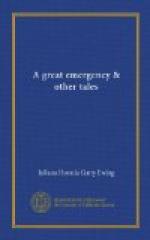“If this is our field, Sandy,” said I, when we got to the first stile, “I’m very sorry, but it really won’t do. I know that lots of people come through it. We should never be quiet here.”
Sandy laughed. He didn’t speak, and he didn’t get over the stile; he went through a gate close by it leading into a little sort of bye-lane that was all mud in winter and hard cart-ruts in summer. I had never been up it, but I had seen hay and that sort of thing go in and come out of it.
He went on and we followed him. The ruts were very disagreeable to walk on, but presently he led us through a hole in the hedge, and we got into a field. It was a very bare-looking field, and went rather uphill. There was no path, but Sandy walked away up it, and we went after him. There was another hedge at the top, and a stile in it. It had very rough posts, one much longer than the other, and the cross step was gone, but there were two rails, and we all climbed over. And when we got to the other side, Sandy leaned against the big post and gave a wave with his right hand and said, “This is our field.”
It sloped down hill, and the hedges round it were rather high, with awkward branches of blackthorn sticking out here and there without any leaves, and with the blossom lying white on the black twigs like snow. There were cowslips all over the field, but they were thicker at the lower end, which was damp. The great heat of the day was over. The sun shone still, but it shone low down and made such splendid shadows that we all walked about with grey giants at our feet; and it made the bright green of the grass, and the cowslips down below, and the top of the hedge, and Sandy’s hair, and everything in the sun and the mist behind the elder bush which was out of the sun, so yellow—so very yellow—that just for a minute I really believed about Sandy’s godmother, and thought it was a story come true, and that everything was turning into gold.
But it was only for a minute; of course I know that fairy tales are not true. But it was a lovely field, and when we had put our hands to our eyes and had a good look at it, I said to Sandy, “I beg your pardon, Sandy, for telling you not to talk with your mouth full. It is the best field I ever heard of.”
“Sit down,” said Sandy, doing the honours; and we all sat down under the hedge.
“There are violets just behind us,” he continued. “Can’t you smell them? But whatever you do, don’t tell anybody of those, or we shan’t keep our field to ourselves for a day. And look here.” He had turned over on to his face, and Richard and I did the same, whilst Sandy fumbled among the bleached grass and brown leaves.
“Hyacinths,” said Richard, as Sandy displayed the green tops of them.
“As thick as peas,” said Sandy. “This bank will be blue in a few weeks; and fiddle-heads everywhere. There will be no end of ferns. May to any extent—it’s only in bud yet—and there’s a wren’s nest in there——” At this point he rolled suddenly over on to his back and looked up.




